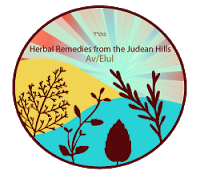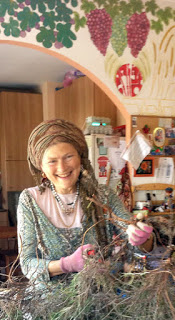סירה קוצנית – Prickly Burnet – Linnaeus, Poterium Spinosum
Printable Version
Pot-Shaped, Paradisiac Thorn of Division
Prickly burnet is considered the main component of middle-eastern terrain. When we first inspected our plot of land in Bat Ayin, we found it overgrown with thorn-bushes. The land was hard and dry and nothing but thorns could grow here. It took years of hard work until we were able to uproot and keep the thorns at bay, to make room for fruit-trees, herbs and greens. When I later discovered that the aggressive thorn was no other than the biblicalסִּרָה קוֹצָנִית /seerah kotzanit – ‘prickly burnet,’ I was happy that traces of this thorn-bush remained at the edges of our plot. Both its Hebrew and Latin names reflect the resemblance of its flower-seed to a mini cooking-pot. Each of its multiple flowers is surrounded by four or five sepals joined together to form a small pot. This little pot is green when young, reddish at maturity, and rusty brown in its last stages, when the color is similar to a fired clay pot. The tips of the sepals cover the top of the pot, in the shape of a tiny pot cover. This structure gives the plant its name: סִּרָה/seerah – ‘pot.’ Dr. Ephraim Hareuveni concluded that the seerah in the Bible and Talmud is a name for the thorny plant named by Linnaeus, Poterium Spinosum from the Greek ‘poterion’ – drinking cup. The short branches of the prickly burnet divide into two, which in return continue to divide several times. Observing its dichotomic branching structure reminds me of the consequence of eating from the Tree of Knowledge of Good and Evil. This original sin caused the division of the unified Divine reality. Since then we experience a gap in the inherent harmony between Humanity & G-d, Man & Woman, Israel & the Nations, Body & Soul etc. When Adam was cursed with “thorns and thistles” (Bereishit 3:18) – the prickly burnet with its multiple dichotomic branching structure, representing the ensuing dichotomy of the world – is very likely the original thorn that sprouted forth as a consequence of eating from the Tree.
Thorns of Ruin
The Book of Hoshea compares Israel to an unfaithful wife who profanes her exclusive covenant with Hashem. The prophet describes how the prickly burnet is instrumental in curbing the daughter of Israel when she wanders off into side-paths and goes astray:
ספר הושע פרק ב פסוק ח לָכֵן הִנְנִי שָׂךְ אֶת דַּרְכֵּךְ בַּסִּירִים וְגָדַרְתִּי אֶת גְּדֵרָהּ וּנְתִיבוֹתֶיהָ לֹא תִמְצָא:
“I will hedge up your way with prickly burnet, and raise fences, and she shall not find her paths” (Hoshea 2:8).
In the Torah, this conspicuous thorn is described both as a deterrent to sin and as a means of punishing the sinner. Tehillim 58 deals with the evil of the wicked who spreads wrongdoing and injustice throughout the land. The following verse describes his punishment:
ספר תהילים פרק נח פרק י בְּטֶרֶם יָבִינוּ סִּירֹתֵכֶם אָטָד כְּמוֹ חַי כְּמוֹ חָרוֹן יִשְׂעָרֶנּוּ:
“Before your prickly burnet will feel thorny, while they are still green, [Hashem] shall sweep them away in a burning whirl-wind” (Tehillim 59:10 Dr. Reuveni’s translation).
The burning whirlwind will catch the wicked while they are still in the fullness of power. Similarly, the prickly burnet shrubs catch fire and are destroyed even while they are still green, and before they have turned to thorns. The great fire will consume them quickly and utterly, like tangles of prickly burnet that burns in minutes like dry straw as the prophet testifies:
ספר נחום פרק א פסוק י כִּי עַד סִירִים סְבֻכִים וּכְסָבְאָם סְבוּאִים אֻכְּלוּ כְּקַשׁ יָבֵשׁ מָלֵא:
“For they are entangled with prickly burnet thorns, drunken as with their drink; they are devoured as stubble fully dry” (Nachum 1:10).
Yesha’yahu uses the imagery of prickly burnet to underscore how the palaces of the Edomites will be utterly destroyed. In his vision, the prickly burnet shrubs slowly spread from the uncultivated fields outside the walls into the destroyed city, taking root in the palaces and mansions, where they will flourish forever:
ספר ישעיה פרק לד פסוק יג וְעָלְתָה אַרְמְנֹתֶיהָ סִירִים קִמּוֹשׂ וָחוֹחַ בְּמִבְצָרֶיהָ וְהָיְתָה נְוֵה תַנִּים חָצִיר לִבְנוֹת יַעֲנָה:
“The prickly burnet thorns shall come up in her palaces, nettles and brambles in her fortresses: and it shall be a habitation of wild dogs, and a court for owls” (Yesha’yahu 34:13).
The fact that the prickly burnet is a symbol of ruin and destruction lends additional support to it being the original thorn sprouting forth as a result of primordial sin.
Crackling Thorns
King Salomon makes a pun with the word for cooking pot הַסִּיר/haseer and הַסִּירִים/haseerim –the prickly burnets:
“For as the crackling of the prickly burnet (seerim) under the pot (seer), so is laughter of the fool; and this too is futility” (Kohelet 7:5).
The laughter of the fool is like the crackling sound of the burning prickly burnet, which burns up quickly, for the laughter of the fool brings no lasting joy. True enduring happiness is found only when connecting with the unity of Hashem’s oneness beyond the divisions of the world, represented by the dichotomic branching structure of the prickly burnet. Rabbi Yehoshua ben Levi said: All trees, when they burn do not produce loud noises, but the seerim do, as though they are saying “we too are trees!” (Midrash Kohelet Zuta 7:5). From the days of Kohelet to the days of Rabbi Yehoshua ben Levi, some 1,100 years went by. More than 1,800 years have passed from Rabbi Yehoshua ben Levi to our day. Yet, we can still go out to the fields of Israel, gather the seerim shrubs and listen to their burning crackle (Noga Reuveini).
Caught by the Prickly Burnet
The divisive prickly burnet also played a role in the rift between Shaul and David. Although Shaul repeatedly attempted to kill him, David spared Shaul’s life on several occasions. Once, when he found Shaul and his bodyguard, Avner, off-guard, he cut the corner of Shaul’s robe. David later pleaded with Shaul to stop pursuing him, “Look, my father, at what I have in my hand. It is a piece of the hem of your robe! I cut it off, but I didn’t kill you. This proves that I am not trying to harm you and that I have not sinned against you, even though you have been hunting to kill me” (I Shemuel 24:11). Yet, Avner rebutted David’s claim and thus prevented Shaul from being reconciled with David by telling Shaul, “Your cloak was caught by a seerim shrub and it became ripped, without your noticing it” (Midrash Bamidbar Rabbah 19:2). Eventually Avner met his death for using the seerah bush pretext to prevent mending the rift between Shaul and David.
ספר שמואל ב פרק ג פסוק כו וַיֵּצֵא יוֹאָב מֵעִם דָּוִד וַיִּשְׁלַח מַלְאָכִים אַחֲרֵי אַבְנֵר וַיָּשִׁבוּ אֹתוֹ מִבּוֹר הַסִּרָה וְדָוִד לֹא יָדָע:
“Yoav left David and sent messengers after Avner, and they brought him back from the cistern of the seerah, and David didn’t know” (II Shemuel 3:26).
What is the cistern of the seerah? Rabbi Abba bar Kahana said: “The cistern and the seerah caused Avner’s death” (Babylonian Talmud, Sanhedrin 49a).
Bedouin Diabetes Remedy
The Bedouins use the roots of prickly burnet as a remedy for diabetes. A delegation of German and Syrian researchers who were finding new medicinal herbs in the mountains of Syria in 1926 reported the effect of the thorny pot on the sugar level in the blood. The research showed that the Bedouins were able to cure their diabetes by drinking the essence of prickly burnet several times a day. After drinking this brew for several months, they improved substantially. In some instances, they were completely healed of diabetes. During the 60ties, the department of pharmacy from Hebrew University, Jerusalem investigated the effect of the thorny pot on the sugar level in the blood. They discovered an interesting fact. The active ingredient is not present in the thorny pot during the entire year, but only during the months from May-August. The researchers also discovered that the active ingredient of the plant was specifically in the peal of the roots.
Hands On
Here is how the Bedouins used the prickly burnet to cure diabetes. I do not vouch for the taste. Remember it is medicine!
Bedouin Diabetes Remedy
1. Uproot four prickly burnet thorns.
2. Cut off all the parts of the thorns above the roots.
3. Wash the prickly burnet roots well.
4. Hang the roots up to dry.
5. Crush the root with a mortar (Bedouin style), or in an electric grinder (Western style).
6. Boil the roots for half an hour.
7. Leave the roots on a small fire for 10-20 hours (a crock-pot on the lowest setting will do).
Shortcut: If you are unable to dry and crush the roots, you could make the brew with the fresh roots in a crock-pot half an hour on the high setting and 10-20 hours on the lowest setting.



